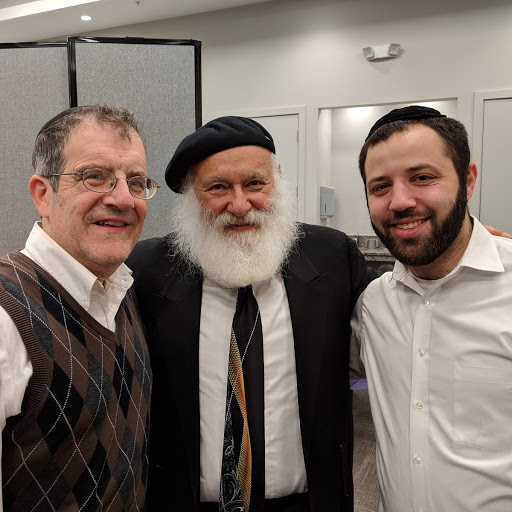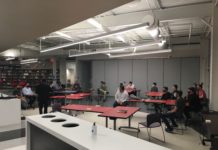The weekend of November 2-3 was one full of teachings on peace of mind, body, and spirit for members and guests of Northbrook’s Darchei Noam Glenbrook, a small modern orthodox shul. Scholar-in-residence Rabbi Dr. Laibl Wolf, founder of Spiritgrow in Melbourne, Australia, enlightened everyone with his flavorful mixture of mindfulness, chassidus, psychology, and Jewish wisdom crafted from his experiences of growing up the son of Holocaust survivors and needing a way to cope with the anger he felt.
The nearly 100 Shabbat dinner attendees were enthralled with his talk entitled “Love Is Not Negotiable: Commitment, Exploitation, and Emotional Freedom.” He opened with Victor Frankl and the importance of meaningful relationships and sense of purpose to help sustain one’s life. He illustrated this with Frankl’s assertion that concentration camp prisoners who had strong familial relationships and friendships had a greater survival rate.
Rabbi Wolf talked about an interpretation of the Hebrew word “yode’ah,” to know, saying that when you fully know someone or something, you essentially remove the separation between you and the other, hence becoming more united, more selfless. He made reference to Martin Buber’s I and Thou and emphasized the importance of treating everything and everyone not simply as a means to an end but as having their own value and purpose.
Rabbi Wolf made the distinction between “control” and “assertion” when in a relationship: you should not aim to control or manipulate the other person, but rather you should assert yourself and who you are. By doing this you are on the path to “yode’ah” and greater unity with the other person. Strong self-identity promotes strong relationships. That is, as the Kotzker Rebbe taught, “If I am I because you are you, and you are you because I am I, then I am not I, and you are not you. But if I am I because I am I, and you are you because you are you, then I am I, and you are you, and then we can love each other and grow together.”
Shabbat morning included a drasha by Rabbi Wolf, “Lao-Tzu, the Besht, and Your Life’s Journey,” where he spoke about appreciating the journey of life and understanding that the most important and satisfying thing in life is passing our values on to our children. The drasha also revealed the influence Judaism has had on Eastern philosphy, demonstrating how many of the words and concepts in Eastern thought originated from the Torah.
Morning services concluded with a kiddush lunch and “Laughter and Tears: Tales and Songs of Restless Souls,” where Rabbi Wolf told Chasidic tales from Rabbi Nachman of Breslov and the Baal Shem Tov as well as other stories about rebbes and their Chasidim. A highlight was Rabbi Wolf teaching the group an old Russian niggun.
The residency concluded Saturday evening with a reception and the presentation “Neutralize Stress and Anxiety: Mindfulness as an Antidote to Worry and Anxiousness.” In this final address to the community, Rabbi Wolf relayed the importance of stress relief – preferably the absence of stress – on both our physical selves and our emotional and mental selves.
The modern-day habits of stress, anxiety, and anger wreak havoc on our bodies and our brains. Anger, he said, is about what you want to control and what you need, not about anyone else, and the expression of anger, or “venting,” only makes it easier to express it again and again due to the brain’s neuroplasticity. Thus we should be careful not to express anger, particularly with children. Even when doling out consequences for undesired behavior, be mindful that you love your child, and your body language will reflect this.
Another suggestion for the path to healthier living refers to “emunah,” or faith, and “bitachon,” or trust. Emunah refers to the belief that every hardship you have endured thus far has contributed to the positive aspects of your character. Bitachon is the concept that the challenges you face now will ultimately have a positive outcome. Adopting these mental practices will lead us to three desired results: good health, more satisfying relationships, and greater happiness.
Rabbi Wolf visited Darchei Noam Glenbrook at the invitation of member Cindy Taitz, a native of South Africa. Her late father, Harold Restein, shared a very special connection with Rabbi Wolf. In the last few years of Harold’s life, he and Rabbi Wolf spent much time engaged in meaningful conversations spanning a wide variety of interests while developing a companionship that allowed Harold to continue his intellectual and spiritual endeavors despite his physical limitations. When Rabbi Wolf was planning to travel in the United States, he reached out to Cindy, and she arranged the trip to Chicago and orchestrated the weekend during which he showered the congregation with his compassion and insight. “I could not be more grateful to Rabbi Wolf for traveling to Chicago to share this Shabbat with us,” said Cindy.
Rabbi Wolf has the unique ability to take deep and esoteric concepts and make them very real and practical. From his lessons on love and commitment to his Chasidic tales to his masterful presentation on mindfulness, stress, and neuroplasticity, everyone who participated in this special scholar-in-residence Shabbat left with new insight and inspiration.
Committed to maintaining a welcoming and supportive atmosphere for its members and guests and to providing the opportunity for spiritual learning and growth, Darchei Noam Glenbrook strives to meet the spiritual, religious, educational, and social needs of its members within the framework and halakha of modern orthodox Judaism. DNG is a community comprised of members who are integral participants in secular society. Members recognize their social and civic responsibilities and are deeply committed to religious tradition, study of Torah, and observance of Shabbat and kashrut laws. The DNG community believes in the love for fellow Jews and is a strong advocate and supporter of the State of Israel. www.darcheinoamglenbrook.org







